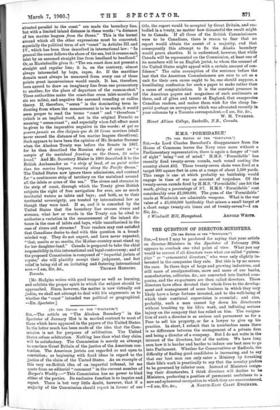THE ALASKAN BOUNDARY.
[To THE EDITOR OF THE " SPECTATOR:]
Sin,—In your article on the above in the Spectator of January 31st you say that "the idea of the coast in the minds of the diplomatists who drew up" the Treaty of 1825 "was not political but geographical." "The fact that the phrase the windings of the coast' was used seems to us to indicate that the diplomatists who made the Treaty did in the case of the big inlets mean to follow them round with a thirty-mile radius." I must ask you to read the draft projets of Treaty interchanged between the British and Russian Governments, which were published in the Bebring Sea Arbitration Papers. In each mer was used as indicating from where the inland dis- tance was proposed to be measured. In the Russian draft the words were : du bord de la mer; in the British they were : depuis la seer. Further consideration led both nations to change the term to l' Ocean in the Treaty. "The sea," said Mr. Wharton, "technically so termed, includes ports and havens, rivers and creeks, as well as the sea coasts." The open ocean, says Mr. Justice Story, is the high seas, outside the fauces terrae. " Sea " and " ocean " are terms of art, and must, therefore, receive their technical meaning. Thus the political idea was engrafted in the Treaty. But other terms in the Treaty apparently imply the same. The "summits of the mountains
situated parallel to the coast" are made the boundary line, but with a limited inland distance in these words: "a distance of ten marine leagues from the Ocean." This is the kernel around which all the other expressions must be concreted, especially the political term of art "coast" in Articles III. and IV., which has been thus described in international law: "In general the coast follows the shore of the sea, but it crosses each inlet by an assumed straight line from headland to headland." Or, as Hautefeuille gives it: "The sea coast does not present a straight and regular line; it is, on the contrary, almost always intersected by bays, capes, Sze. If the maritime domain must always be measured from every one of these points great inconvenience would result. It has, therefore, been agreed to draw an imaginary line from one promontory to another, for the place of departure of the cannon-shot." These authorities make the coast-line cross inlet-mouths (of six sea miles), and negative the assumed rounding or radius theory. If, therefore, "ocean" is the dominating term in- dicating from where the measurement is to be made, it would seem proper to read the terms " coast " and " therefrom " (which is an implied word, not in the original French) as meaning " ocean-coast " ; and especially when full effect must be given to the imperative negative in the words : et qui ne pourra jamas en etre elaignee qv,e de 10 lieues marines (shall never exceed the distance of ten marine leagues therefrom). Such appears to have been the opinion of Mr. Senator Sumner when the Alaskan Treaty was before the Senate in 1867, for he then described the Russian strip of coast as "a margin of the mainland fronting on the Ocean, 30 miles broad." And Mr. Secretary Blaine in 1890 described it to the British Ambassador as "a strip of land, at no point wider than ten marine leagues, running along the Pacific Ocean." The United States now ignore these admissions, and contend for "a continuous strip of territory on the mainland around all the inlets or arms of the sea." The rivers and streams in the strip of coast, through which the Treaty gives British subjects the right of free navigation for ever, are as much territorial waters as inlets and bays; and both, as to their territorial sovereignty, are treated by international law as though they were land. If so, and it is conceded by the United States that the boundary line crosses rivers and streams, what law or words in the Treaty can be cited to authorise a variation in the measurement of the inland dis- tance in the case of inlets and bays, while unauthorised in the case of rivers and streams? Your readers may rest satisfied that Canadians desire to deal with this question in a broad- minded way. They do not expect, and have never expected, "that, merits or no merits, the Mother-country must stand up for her daughter-land." Canada is prepared to take the chief responsibility in this international and legal controversy; and if the proposed Commission is composed of "impartial jurists of repute," she will placidly accept their judgment, and feel relief in being rid of an irritating and festering international
[Mr. Hodgins writes with good temper as well as learning, and exhibits the proper spirit in which the subject should be approached. Since, however, the matter is now virtually sub judice, we shall not attempt to deal with his arguments as to whether the " coast " intended was political or geographical. —ED. Spectator.]











































 Previous page
Previous page